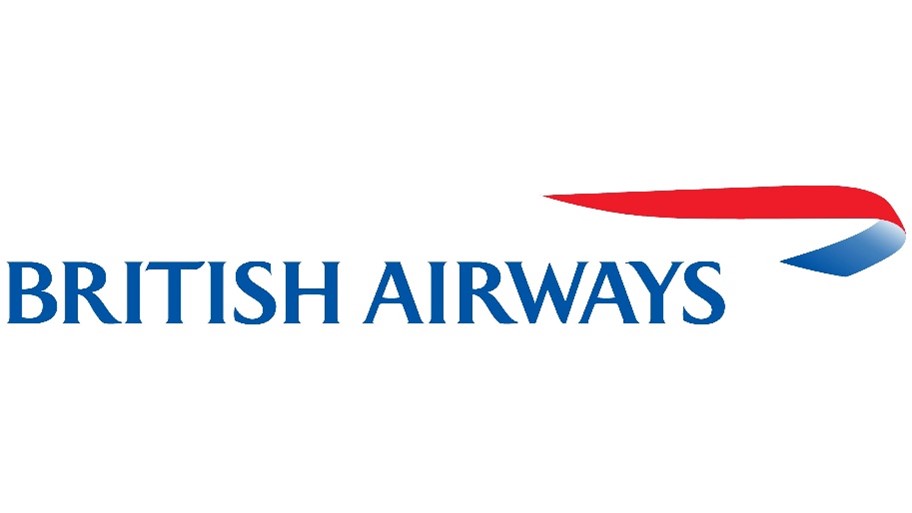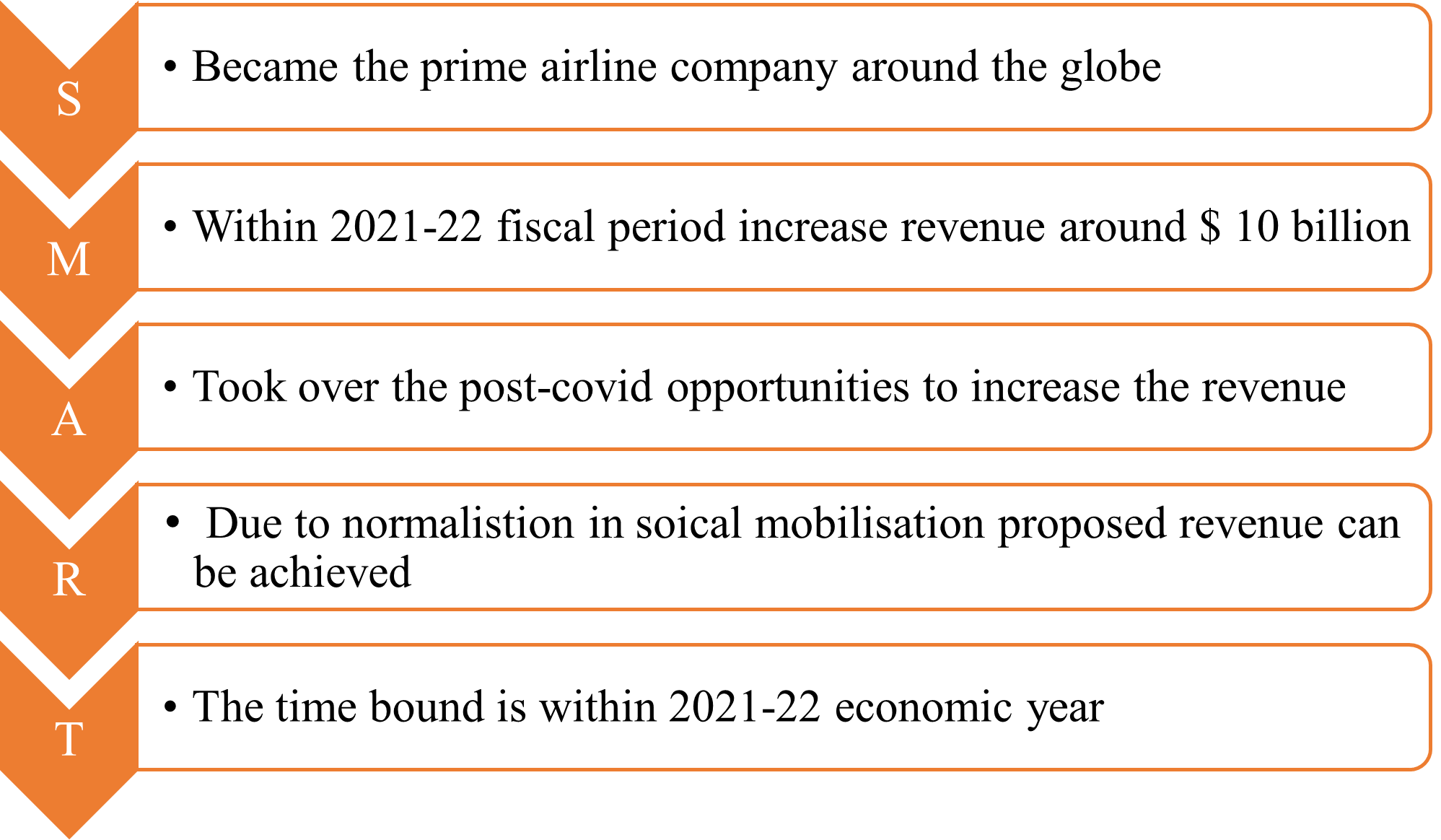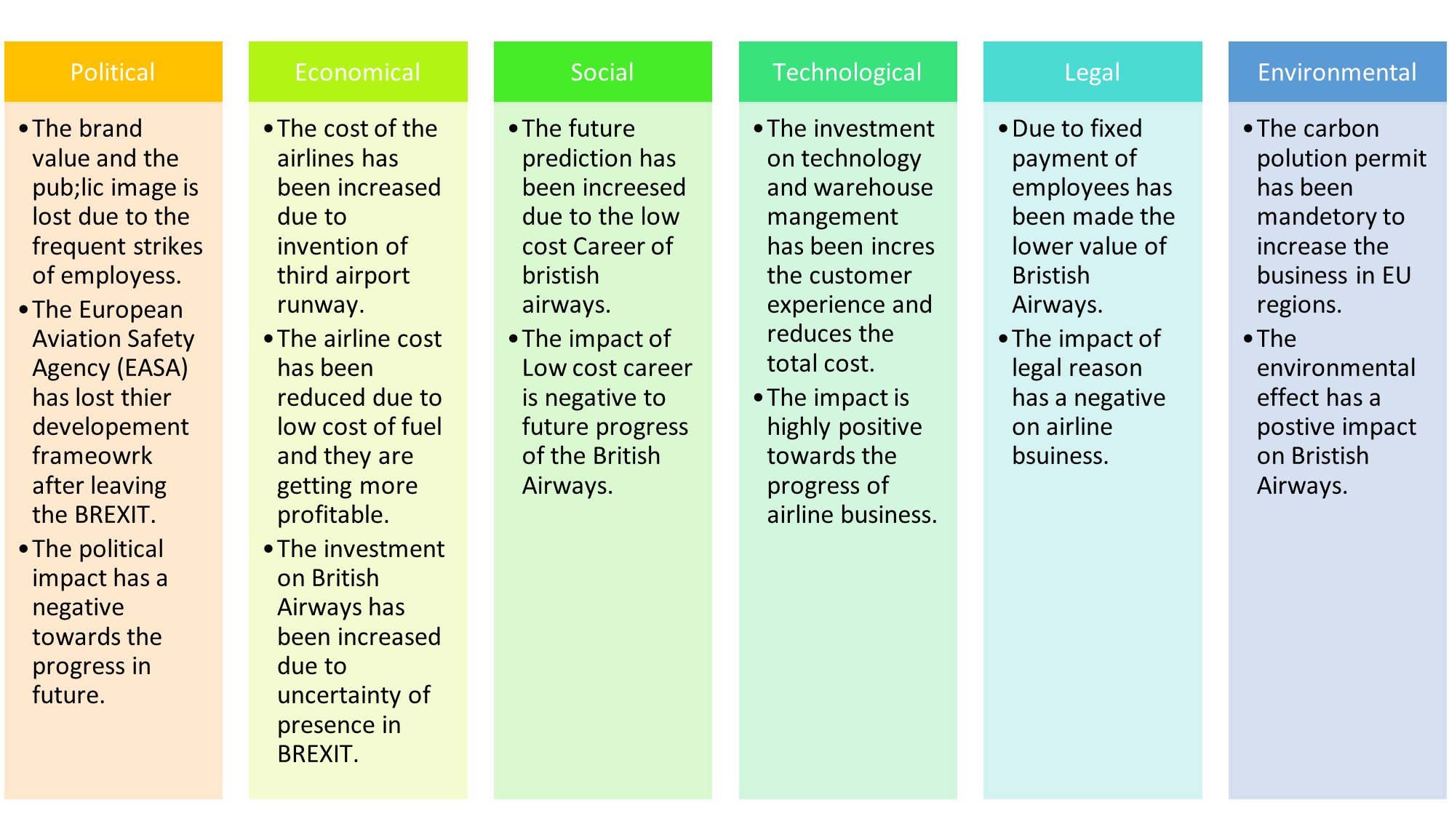Strategic Planning Assignment: Impact of COVID-19 on British Airways (BA)
Question
Task:
In this strategic planning assignment task, students will be creating an Applied Project A-to conduct external and internal analysis of the business. To complete this project student will be selecting a case study on Travel & Tourism Industry of their choice/preference. As we have identified that in this Covid –19 situation Travel & Tourism Industry is the one which has hit very hard and have struggle to the maximum to maintain and retain its business. It has been observed that from time to time this industry have made changes and improved its Strategic Planning’s to retain in the business environment.
Project A -Description
Following requirements should be satisfied by the students: -
- Explanation of A very brief overview of the firm and its product or service and target market.
- Explanation of Vision, Mission Statement & Goals:
- What is the organization’s Vision, mission, and goals? Do you believe in the mission? Do you feel your work is contributing to the advancement of the mission, Vision, mission, and goals?
- What does internal and external stakeholder need or expect from us? How well have organisation performed against these expectations in the past?
- What are the immediate results that can be observed because of strategic plan? Long-term results?
- Explanation of Unique differentiating features. Highlight the unique features of your products/services, particularly what is going to make and stand out above the rest.
- Complete a PESTLE analysis–Explanation of Internal and External Factors are important. Internal Capacity
- How effective is our staff? Our Board of Directors?
- How effective is the organization’s management and leadership?
- What are the human and physical resources required to operate strategic plans?
- Does the organization have sufficient resources available? Will these be affected in the future?
- What environmental trends do we need to be aware of, and take into consideration, as we think about our future strategic direction? This could include economic, political, legal, environmental, social, or technological changes.
- What are the greatest areas of needs for our clients/our community? Do you foresee this changing in the next five years?
- What are the opportunities for the organization to make a bigger impact? Are there policy, advocacy, or service gaps that the organization could be fulfilling?
- COVID-19 impact due to the government restriction/political decision in the travel and tourism industry
- Recommend at least 3unique ways your selected business may offer to control mental health and anxiety during COVID-19 as client attraction.
External Assessment Environmental Trends
Answer
Introduction
The current report on strategic planning assignment is focused on “Tourism” which is one of the most influential sectors that provides both customer satisfaction and revenue generation which contributes to the growth of the gross domestic product for any specific region (Kyrylov et al., 2020). A huge number of people continues their livelihood by depending upon the tourism industry all over the world. A spot needed to be well equipped to grow as a tourist site rather not only depending upon any scenic beauty or place or item to experience. Infrastructures like flooding and lodging, well-developed communication processes through transport networks is needed to flourishment of any spot. However, the outbreak of Covid-19 in the last one and a half years severely affected the tourism industry worldwide (Sharma, Thomas and Paul, 2021). The study tends to identify the impact of covid-19 on the British tourism industry through elaborating the case of British Airways (BA), United Kingdom (UK). For doing this, the author will critically evaluate the objectives of British Airways, and the impact of covid-19 on the business.
1. Brief Overview of British Airways
British Airways formerly known as Aircraft Transport and Travel Limited started its journey in 1919 and now working as the second-largest carrier in the UK based on the number of passengers carried and fleet size. In 2011, BA created a coalition with the Spanish airline company Iberia and formed a new joint-holder company namely International Airlines Group (IAG) and this company became the third-largest airline company across the world based on revenue generation (Horton, 2021). In 2019, BA accounted for an approximate turnover of $13,290 million by serving almost 45.2 million passengers and earning a profit of $1,447 million approximately (Kuljanin et al., 2021).

Figure 1: British Airways
(Source: Horton, 2021)
2. Vision, Mission and Goals of British Airways
2.1 Critical evaluation of the Vision, Mission, and goals
To develop in the market any organisation should define some objectives and the path to achieve those objectives will solely design the vision and mission of the organisation. The vision, mission and goals of BA are as follows-
Vision
The most significant vision of BA is to develop the organisational culture to become the most responsible air freight carrier in the world. That is why it originated one banner called ‘one destination’ and brought all of its corporate social responsibilities (CSR) within it (Tiemeyer, 2021).
Mission
To satisfy the vision BA adopted policies like reducing carbon generation by 50% within 2025, minimising noise pollution, bettering air quality, and waste management through recycling (Golden, 2021).
Objectives

Figure 2: SMART Objectives for the British Airways
(Source: Tiemeyer, 2021)
The above mentioned objective will help the organisation to achieve the target goal and improve the current situation of business.
2.2 Role of internal and external Stakeholders
Internal stakeholders are those who are directly related to the company operation like employees, owners, and investors rather external counterparts are those who do not work in the organisation but are indirectly related like suppliers, creditors, and concerned authority (Gamble, Clinton and Díaz-Moriana, 2021).
Internal Stakeholders role
- Employees like flight crew, pilots, engineers always try to provide advanced customer service because an effective and comfortable flight experience is the key to success for attaining new customers.
- The responsibility of the BA management is clear to alleviate all the negatives that arose due to covid-19 and provide a safe and sound environment while travelling in BA.
- Investors role is also distinct which is to provide funds to maintain all the necessary guidelines for negotiating covid contamination provided by the health department of the UK government.
External Stakeholders role
- The creditor's role is specific as they have to believe in the functioning of BA in the case of market revival. Creating pressure for the amount can deteriorate the condition of the organisation and a huge number of employees will feel insecurity and in turn, the customer service deteriorate.
- The role of government is highly important because proper monitoring of the overall system can only be analysed by the government departments like public aviation, excise, and health.
2.3 Immediate and Long-term results due to strategic plan
A strategic plan is conducted to achieve some goals. Some of them for short-run and some represents long-orientation. The strategic objectives of BA will satisfy some objectives like-
Immediate outcomes
- The number of passengers will increase
- The revenue generation will increase
- The disturbances due to covid will reduce
- The internal stakeholders will work with their full productivity
- The profit margin will automatically increase in the next fiscal period
- The number of flights will increase
- The investment will increase due to flourishment in the concerned economy
Long-term outcomes
- BA will be considered as one of the prime airline companies in the UK, Europe, and the world.
- To achieve a passenger about of 60 million within 2025.
- To increase the profit by $2000 million within 2030.
- To reduce carbon emission by 50% within 2025.
- To increase the annual turnover up to $18000 million by 2027.
3. Unique features of the service of British Airways
In the case study, the features of British Airways are most reliable and more customer-centric. Some of the unique features are hereby mentioned (Kuljanin et al., 2021).
- As per the report, British airways serves 45 million passengers. Their services are spread all over the world and on the flight, they serve more than 25 million cups of tea and 9.9 million bottles of wine and they also serve champagne more than 1.25 bottles.
- British Airways serves complimentary sufficient foods and some drinks for long-haul flights.
- The airways also provide the free seat selection process within 24 hours of starting of journey.
- The check-in process is also provided without any additional cost.
- For business purposes, the airways provide the business class of cabins at every flight.
- British Airways also provide the picked up facilities of bags from the airport location to checked-in flights. These facilities are exclusive for British Airways.
- They also provide the facilities to check-in up to 20 minutes before the time of departure in case of Business class.
- The travelling from London city to another city or abroad they also provide the hoot and cold meal facilities with a warm breakfast and light snack with signature tea at afternoon.
4. PESTLE Analysis of Internal and External factors
In this section, the main discussion is covered up the external and internal factors of British Airways by PESTEL analysis (Gupta, Gupta and Gupta, 2019). Six segments are used to analyse these factors.

Figure 3: PESTLE Analysis
(Source: Karami, 2017)
The company has an effective staff but due to lockdown most of the staffs has lost their jobs, for which the organisation is suffering from shortage of manpower. On the other hand, the board of directors are searching for effective stratrgies so that the system can be effectively funcition.
The company has a strong organisational management and leadership, which is struggling with the situation due to cancelation of flights. Though the management and leaders are motivating the staffs by providing training and open communication with them.
The human and physical resources are computer networks to ticket process, flght planning, dispatch, accounting and crew scheduling. Moreover, weather tracking with seating calculation is also done with computers. The company has sufficient available resources and as the manpower has been reduced, all of the resources are not utilised.
The political impact has a negative towards the progress in future. Economical factors have a positive impact. The social impact of Low-cost careers is negative to the future progress of British Airways. The technological impact is highly positive towards the progress of the airline business. The impact of legal reasons has a negative on the airline business. The environmental effect has a positive impact on British Airways (Karami, 2017).
5. External assessment of environmental trends
In this case, the business of British Airways has been fallen due to Covid-19 impacts. Also, the effect of external factors has been made a negative impact on the airline business. British Airways has been served its airline business in more than 75 countries across the world. The airport has been acquired by British airlines are more than 169 destinations (McLachlan, James and Hampson, 2018). Some of the factors that have to maintain while the spreading of the airline business. while running the flights into the air, the pollution due to the fuel exerted by the airline can cause an environmental effect. The environmental effect has been analysed by the assessment of the environment. This environmental effect is determined by the limited amount of fuel exertion of airlines. According to Budd, Ison and Adrienne (2020), the respective authority has been taken for granted by the European Aviation Safety Agency (EASA). The safety and securities of the environmental impact are granted by another respective authority of environmental safety and measurement standards.
6. Impact of Covid-19 in the business
The global pandemic situation has made an impact on every sector of the business. The travel industry has also been affected by the airline business in the UK. The British airline agencies are also affected due to this Covid-19 impact (Budd, Ison and Adrienne, 2020). In this section, the discussion is based on the global pandemic situation and its impact on the travel business. In this case, the business of British Airways has been fallen due to Covid-19 impacts. Also, the effect of external factors has been made a negative impact on the airline business. First of all the situation has extremely critical due to the pandemic effect. Human health is also affected by the pandemic effect. The situation of business has been fallen. The business rules and regulation has been changed in this industry. The number of passengers has been increased as the government rules towards human safety and measurements. Some of the employees have been lost their jobs in this pandemic situation (Amankwah-Amoah, 2020). As the global economic condition has been fallen since the passenger's fairs and their expenditure has been reduced and the fair bearing capacity has been also reducing. Therefore the business turnover is reduced lass than normal condition by keeping remain same the airline expenditures.
7. Recommendations
Some recommendations to cope up with the stress arising due to covid 19 is as follows-
- Stay connected with People
For mental well-being, the employees of BA should be connected with their loved ones. Interacting with them will reduce their mental blockage and they will rejoin their work without any stress. This will ultimately reduce the chances of any error within the stipulated work and the customer safety index increases.
- Talk about the worries
Numerous people are feeling worried due to Covid both physically and economically. Without sharing these worries is drawing frustration among them and after a certain time, it can cause an outburst. That is why time-worthy sharing can to loved ones or a counsellor can dry up the frustration.
- Support others
If anyone has the capacity then he/she should provide economic and mental assistance to others. This will in turn relieve their frustration and life will be filled with joy.
8. Conclusion
In this case study, the result of the analysis of factors has a negative effect on the travel business. The outcomes from the business become lower than the normal condition of the business. In 2011, BA created a coalition with the Spanish airline company Iberia and formed a new joint-holder company namely International Airlines Group (IAG) and this company became the third-largest airline company across the world based on revenue generation. After the Covid-19 situation, the travel industry has been fallen and their turnover has been reduced. The responsibility of the BA management is clear to alleviate all the negatives that arose due to covid-19 and provide a safe and sound environment while travelling in BA. Investors role is also distinct which is to provide funds to maintain all the necessary guidelines for negotiating covid contamination provided by the health department of the UK government. The government and respective travel industry authorities have to measure to rebuild the industry. Also, the effect of external factors has been made a negative impact on the airline business. Since, from the analysis, the impact of Covid-19 has made a negative role toward the growth of business and industry.
Reference List
Amankwah-Amoah, J., (2020). Stepping up and stepping out of COVID-19: New challenges for environmental sustainability policies in the global airline industry. Journal of Cleaner Production, 271, p.123000. https://www.sciencedirect.com/science/article/pii/S0959652620330456
Budd, L., Ison, S. and Adrienne, N., (2020). European airline response to the COVID-19 pandemic–Contraction, consolidation and future considerations for airline business and management. Research in Transportation Business & Management, 37, p.100578. https://www.sciencedirect.com/science/article/pii/S2210539520301152
Gamble, J.R., Clinton, E. and Díaz-Moriana, V., (2021). Broadening the business model construct: Exploring how family-owned SMEs co-create value with external stakeholders. Journal of Business Research, 130, pp.646-657. https://www.researchgate.net/profile/Jordan-Gamble-2/publication/340551745_Broadening_the_business_model_construct_Exploring_how_family-owned_SMEs_co-create_value_with_external_stakeholders/links/5e9081eb92851c2f529131e1/Broadening-the-business-model-construct-Exploring-how-family-owned-SMEs-co-create-value-with-external-stakeholders.pdf
Golden, D., (2021). Review of: Phil Taylor and Sian Moore (2019) Cabin Crew Conflict: The British Airways Dispute 2009-11. Global Labour Journal, 12(1), p. 18-25. https://mulpress.mcmaster.ca/globallabour/article/view/4589/3844
Gupta, A., Gupta, N. and Gupta, M., (2019). British Airways-A SWOT and PESTLE Analysis-The impact of Europe 2020 policy. NOLEGEIN-Journal of Corporate & Business Laws, pp.1-11. http://mbajournals.in/index.php/JoCBL/article/view/309
Horton, W., (2021). British Airways At The Forefront Of Change For A Post-COVID-19 Airline World. [online] Forbes. Available at:
Karami, A., (2017). Corporate strategy: evidence from British Airways plc. In The Changing Patterns of Human Resource Management (pp. 46-64). Strategic planning assignment Routledge. https://www.taylorfrancis.com/chapters/edit/10.4324/9781315189093-4/corporate-strategy-evidence-british-airways-plc-azhdar-karami
Kuljanin, J., Kali?, M., Begovi?, B., Mijovi?, N. and Renold, M., (2021). The effect of LCC market entry on dominant FSC's price into long haul sector: A case of Norwegian competition on British Airways' prices on selected transatlantic routes. Journal of Air Transport Management, 91, p.102016. https://www.sciencedirect.com/science/article/pii/S0969699720305950
Kuljanin, J., Kali?, M., Begovi?, B., Mijovi?, N. and Renold, M., (2021). The effect of LCC market entry on dominant FSC's price into long haul sector: A case of Norwegian competition on British Airways' prices on selected transatlantic routes. Journal of Air Transport Management, 91, p.102016. https://www.sciencedirect.com/science/article/pii/S0969699720305950
Kyrylov, Y., Hranovska, V., Boiko, V., Kwilinski, A. and Boiko, L., (2020). International Tourism Development in the Context of Increasing Globalization Risks: On the Example of Ukraine’s Integration into the Global Tourism Industry. Journal of Risk and Financial Management, 13(12), p.303. https://www.mdpi.com/1911-8074/13/12/303/pdf
McLachlan, J., James, K. and Hampson, B., (2018). Assessing whether the environmental impact is a criterion of consumers when selecting an airline. International Journal of Advanced Research, 6(3), pp.740-755. https://eprints.usq.edu.au/33998
Sharma, G.D., Thomas, A. and Paul, J., (2021). Reviving tourism industry post-COVID-19: A resilience-based framework. Tourism management perspectives, 37, p.100786. https://www.ncbi.nlm.nih.gov/pmc/articles/pmc7771910/
Tiemeyer, P., (2021). Cabin Crew Conflict: The British Airways Dispute 2009–11 by Phil Taylor and Sian Moore. Labour/Le Travail, 87(1), pp.208-210. https://muse.jhu.edu/article/791130/summary












